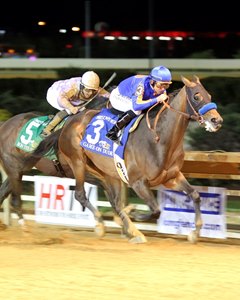Fully Funded Charles Town Classic Back on Schedule


Responding to a request by the state's governor, the West Virginia Racing Commission restored funding Feb. 5 for the $1.2 million Charles Town Classic (G2).
The April race for older horses at Hollywood Casino at Charles Town Races was in jeopardy after a January WVRC vote opposed committing purse fund money at the requested $1.2 million level. A day after that decision, W.Va. Gov. Jim Justice told the Charleston Gazette-Mail he would ask his staff to look into ways to reverse the WVRC decision.
On Monday the WVRC did just that. It first voted to rescind its January vote, then voted 3-0 to approve full funding of the 2018 Charles Town stakes schedule.
Before the vote, WVRC chairman Jack Rossi said that in May or June the commission plans to assemble a focus group to study the best use of purse money. He called on the state's tracks to provide an outline of what they're trying to accomplish with their use of purses, as well as how they are performing toward that goal.
Commissioner Ken Lowe Jr., a former president of the Charles Town Horsemen's Benevolent and Protective Association, in January made the motion to either cut the Charles Town Classic to a $300,000 purse or allow up to $600,000 from the purse fund be committed to the race if Charles Town matched that amount.
Track officials said the $300,000 purse would not work for the race, which aims to bring top older horses to the track in April. They said revenues are not available for the matching funds idea and noted such a funding plan is out of line with how other top stakes purses are funded.
On Monday Lowe voted to support the $1.2 million purse, but said he was making that vote with the understanding that the focus group would be assembled later this year to examine purses going forward. Lowe said it's important for purses to support local racing and breeding.
Track officials have argued that the Charles Town Classic is actually adding money to the purse fund through added pari-mutuel wagering on Charles Town that day and throughout the year. They said having a big event draws bettors to the Charles Town signal, and many of those horseplayers then return to wager on the track.
BloodHorse researched some relevant numbers and found that since 2008, the year before the Charles Town Classic was added, handle at Charles Town is up 2.4% to $190.04 million in 2017. This handle increase occurred despite a 47% reduction in total races, 2,018 to 1,369, from 2008-17. Pari-mutuel wagering per race in 2017, at $138,790, is up 50.9% from 2008.
At the January meeting, Charles Town vice president of racing Erich Zimny said the improvement in handle per race has made the track less reliant on slots money and has prevented further cuts in race dates. Zimny also noted that the race has made an impact on tourism, filling area hotel rooms for the weekend. The Charleston Gazette-Mail reported that Gov. Justice has talked about opportunities for top-level racing to fuel tourism in the state.
This year's Charles Town Classic is scheduled for April 21.
"We want to thank an incredibly supportive local delegation, the office of Gov. Jim Justice, and commission chairman Jack Rossi who is as fair as a regulator as you'll find, and one who puts the state of West Virginia first and foremost, as well as the support from the racing industry as a whole for being instrumental in our ability to conduct all of our marquee racing events in 2018," Zimny said. "With this approval behind us, we can't wait to get started on putting on the best show possible for our fans."
Gov. Justice on Feb. 5 commended the WVRC's decision.
"I'm pleased that the West Virginia Racing Commission has reconsidered and decided to fund the Charles Town Classic race in April. This is the best decision to help us continue to promote and highlight thoroughbred racing in West Virginia," Justice said.
